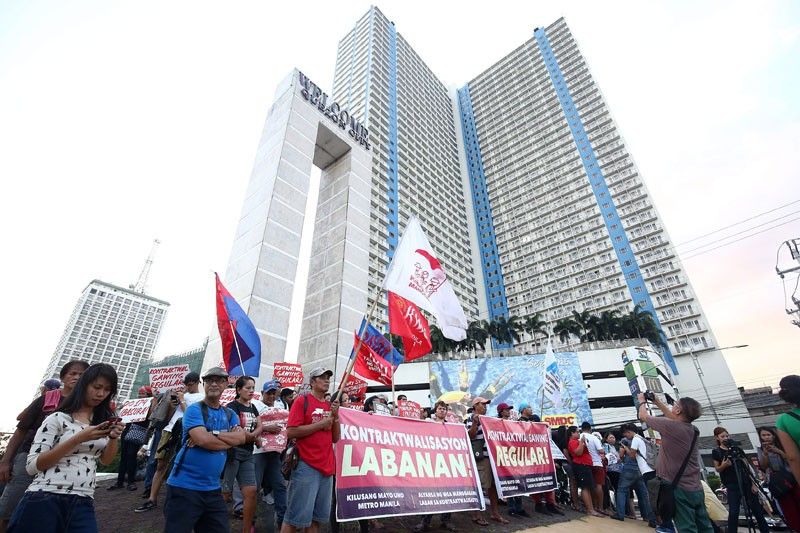‘EO or no EO, labor will never be satisfied’

MANILA, Philippines — With or without an executive order (EO) ending illegal contractualization, workers will never be satisfied.
This was according to presidential spokesman Harry Roque, who scoffed at organized labor’s lukewarm response to the presidential initiative meant as a Labor Day treat for workers.
“Well, they haven’t seen the EO and yet they’re talking like that. This means, whatever is signed by the President, he will always get criticized. The proof is, right after the signing of the EO, the President got hit,” Roque said in Filipino in a radio interview.
He maintained that the President’s signing of the EO was a fulfillment of his campaign promise to abolish contractualization, commonly called end-of-contract or “endo.”
Roque noted that other presidential candidates had made the same campaign promise.
The President, Roque said, had also emphasized in his EO that he wanted all employees to have “security of tenure,” as stipulated in Article 106 of the Labor Code of the Philippines and in the 1987 Constitution.
In support of Duterte’s initiative, Senate President Aquilino Pimentel III vowed to pass legislation banning illegal labor contractualization.
“I support the end of contractualization and approve of the bold move of President Duterte signing an EO to end it. For my part, I will make sure that a law on the matter will be passed as soon as possible to make the gains of workers permanent,” Pimentel said.
He said while the EO would tremendously help workers affected by endo, it can be easily overturned by succeeding administrations.
“A law will make it more difficult to reverse what has been done by the EO,” he said.
Pimentel promised the legislation on illegal labor contractualization would be prioritized once Congress resumes session on May 15.
Sen. Francis Escudero said based on official statistics, there are a total of 1.19 million non-regular workers in the country in 2016, including probationary, casual, contractual or project-based and seasonal workers.
He said that while the Labor Code essentially does not prohibit contractualization, the executive department can regulate it or prohibit it outright.
“As policymakers, it is actually Congress’ job to determine the direction that any administration of government should or will take,” Escudero said.
He said the Labor Code has been amended several times by Congress; however, the provision on contractualization has never been touched.
“So perhaps it is about time the Congress indeed looks into it and decides once and for all whether to prohibit it or we remain in the same regime we had remained for the past 40 years, which is it is the choice of the executive,” he said.
The EO issued by the President, according to Escudero, “may not have ended endo per se” but it “provided certain rules and set off a policy direction along the line.” Such, he added, is a “big push” to end contractualization.
He also reiterated that the government remains the biggest employer of contractual employees.
Meanwhile, the Department of Labor and Employment said the EO can only take effect 15 days after publication in major newspapers.
According to Labor Secretary Silvestre Bello III, the EO authorizes him as labor secretary – in consultation with the National Tripartite Industrial Peace Council – to determine jobs that may be contracted out.
Under the EO, Bello said, contracting or subcontracting when undertaken to circumvent the worker’s rights to security of tenure, self-organization and collective bargaining and peaceful concerted activities pursuant to the 1987 Philippine Constitution, is strictly prohibited.
Security of tenure refers to the right of employees not to be dismissed or removed without just or authorized cause and observance of procedural due process.
“Based on the EO, the principal employer engaged in any arrangement shall be considered the direct employer of the workers for all purposes,” Bello pointed out.
Bello said the signing of the EO was Duterte’s gift to the Filipino workers on Labor Day.
“The signing by President Duterte of the EO spells clearly the policy of his government to fully end illegal contracting and subcontracting practices,” he added.
The President said that despite his signing the EO, his administration will continue exerting all efforts to eradicate all forms of abusive employment practices through the strict enforcement of the provisions of the Labor Code. – Mayen Jaymalin, Paolo Romero
- Latest
- Trending



























